Rob Bignell's Blog, page 262
May 4, 2016
Everyone���s vs. everyones��� vs. everyones
Sometimes 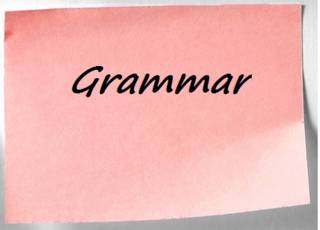 singular and plural pronouns and apostrophes can leave you feeling like you���re swimming in a turbulent ocean. Such is the case with everyone���s vs. everyones��� vs. everyones.
singular and plural pronouns and apostrophes can leave you feeling like you���re swimming in a turbulent ocean. Such is the case with everyone���s vs. everyones��� vs. everyones.
To begin, we should know the difference between everyone and every one. Everyone is the equivalent of everybody and refers to all members of a group, as in The street widening will affect everyone living on the block. In contrast, every one means each individual in a group, as in I will send thank you notes to every one who gave me a wedding gift. To help remember the difference, for emphasis you always can add each (one person) to a sentence containing every one, as in The bride danced with each and every one of the male guests at the reception.
Given this, we can can conclude that everyone is a singular pronoun. That is, it refers to a collection of people or a group. Just as the word group is singular (groups is plural), so everyone also is singular.
So to show possession, the apostrophe should go between the final e and s as in everyone���s. The other two are incorrect, first because everyones��� implies everyone is plural (which it isn���t) and everyones isn���t an actual possessive pronoun like his or hers.
Unfortunately, this grammar rule isn���t universal. In Britain, sometimes everyone and everybody are considered plural pronouns. The recommendation here assumes you���ve made landfall on the American side of the Atlantic.
Professional Book Editor: Having your novel, short story or nonfiction manuscript proofread or edited before submitting it can prove invaluable. In an economic climate where you face heavy competition, your writing needs a second eye to give you the edge. I can provide that second eye.
<A HREF="http://ws-na.amazon-adsystem.com/widg... Widgets</A>
Related articles
 History says no apostrophe on 'pros and cons'
History says no apostrophe on 'pros and cons' Three great formatting tips for ebooks
Three great formatting tips for ebooks
May 3, 2016
Four writing prompts: Acceptance
Good stories 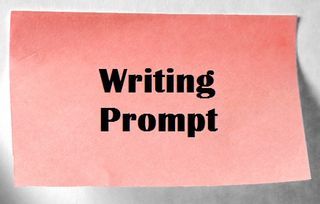 center on the clashing of characters��� goals and motivations. Sometimes a character���s goals and motivations arise from the seeking of acceptance. Here are four writing prompts for stories that center on conflicts over acceptance.
center on the clashing of characters��� goals and motivations. Sometimes a character���s goals and motivations arise from the seeking of acceptance. Here are four writing prompts for stories that center on conflicts over acceptance.
Man vs. nature
To gain acceptance in his society, a young man must prove himself by surviving in the wilderness via some sort of rite of passage. What does the main character learn about himself ��� and about his society���s values ��� as he overcomes the dangerous challenges that nature throws at him during this rite?
Man vs. man
A son seeks the acceptance of his father or a daughter of her mother. Why does the parent not accept the child for who s/he is? Why does our protagonist now feel s/he needs to ��� and is able to ��� gain acceptance (Perhaps the parent is terminally ill, so there is a ticking clock.)? How does the child go about seeking this acceptance, and why is the parent still resistant to giving it?
Man vs. society
Our protagonist ��� an outsider ��� must find a way to fit into his school/workplace/church/town. When he learns a secret that could make him the hero, however, no one believes him. How does he prove his secret to them? Given their attitude toward him, why does he simply not keep the secret to himself and let them suffer the consequences of not knowing the truth until it���s too late?
Man vs. himself
Unable to get along socially in an environment from which he cannot leave, our main character must decide if he should change himself ��� that is not be true to himself ��� to fit in or if he should accept alienation as his lot and make due. Or is there a third option for our main character?
Professional Book Editor: Having your novel, short story or nonfiction manuscript proofread or edited before submitting it can prove invaluable. In an economic climate where you face heavy competition, your writing needs a second eye to give you the edge. I can provide that second eye.
&amp;amp;amp;amp;amp;lt;a href="http://ws-na.amazon-adsystem.com/widg... Widgets&amp;amp;amp;amp;amp;lt;/a&amp;amp;amp;amp;amp;gt;
Related articles
 Writing Prompt: Take your story forward
Writing Prompt: Take your story forward Three potential ways to end your story
Three potential ways to end your story How to create an interesting villain for your story
How to create an interesting villain for your story
May 2, 2016
How to make characters three-dimensional
Today���s sophisticated 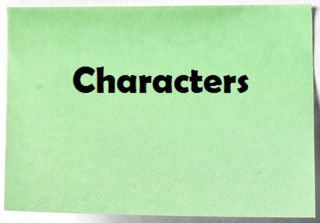 readers generally demand that your stories contain three-dimensional characters, that is, a protagonist who behaves like a real person and who probably grows by learning something along the way. But how do you create such a character? A three-dimensional, or round, character would do the following:
readers generally demand that your stories contain three-dimensional characters, that is, a protagonist who behaves like a real person and who probably grows by learning something along the way. But how do you create such a character? A three-dimensional, or round, character would do the following:
Express multiple emotions
In our daily lives, we rarely express a lone emotion all day or react to all things with the same single feeling. We are cheerful, we are frustrated, we are pleased, we are angry, we are lustful, we are bored. In fact, whenever a person constantly displays only one emotion ��� sadness or anger, for example ��� we tend to worry that there is something wrong with him. Except for the most dire of circumstances, such as to show a character has sunk into deep depression, always have a character express a number of emotions, as the plot permits.
Struggle with conflicting emotions
Most of us find ourselves doing what we think is best though we don���t feel like doing it or vacillating between thoughts as our feelings play tug of war inside us: we want to tell off someone but know we need to bite our tongue; we don���t want to attend our loudmouth neighbor���s party but know his good-natured wife will be offended if we don���t. Have your main character grapple with his emotions as well.
Possess flaws
No one is perfect, except for hackneyed story characters. Allow them to make mistakes, to have weaknesses and fears. If they don���t have a flaw, they risk becoming a comic book-like caricature. Make their flaws integral to the plot so that it stands out.
Undergo change
As a real person, you experience and learn something new everyday; though it may not be earth-shattering, it does affect who you are so that the person you are today is not the person you were 20 years ago. In a story, a protagonist ideally will experience and learn something that changes ��� for the better ��� his perspective on himself or the world.
Display some unique quirk
Each of us has some habit or subtle tic that sets us apart from others ��� biting one���s fingernails when nervous, twirling one���s hair when uncertain, winking at others when feeling happy. Your main character also should have some quirk that is uniquely his, that can come to be associated with him.
Professional Book Editor: Having your novel, short story or nonfiction manuscript proofread or edited before submitting it can prove invaluable. In an economic climate where you face heavy competition, your writing needs a second eye to give you the edge. I can provide that second eye.
<A HREF="http://ws-na.amazon-adsystem.com/widg... Widgets</A>
Related articles
 I refuse to give up on my writing because I haven't explored every possible way to revise it.
I refuse to give up on my writing because I haven't explored every possible way to revise it. Zip two disparate stories into one tale
Zip two disparate stories into one tale Consider using episodic fiction plot structure
Consider using episodic fiction plot structure
May 1, 2016
Five Great Quotations about Our Readers
���...for the 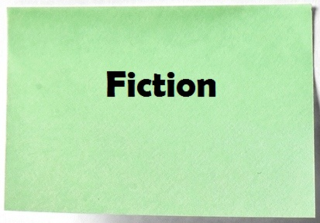 right readers, your vision blooms off the page and is absorbed into their minds like smoke, where it will re-form, whole and alive, fully adapted to its new environment.��� - Mary Gaitskill
right readers, your vision blooms off the page and is absorbed into their minds like smoke, where it will re-form, whole and alive, fully adapted to its new environment.��� - Mary Gaitskill
���We as authors sign a pact with our readers; they���ll go on reading because they trust us to play fair with them and deliver what we���ve promised.��� - Pamela Glass Kelly
���Primary goal for the author: ���Write what you mean to say���
���Primary goal for the reader: ���Read what the author actually writes��� - Falcon Dove
���Sophisticated readers understand that writers work out their anger, their conflicts, their endless grief and rolling list of loss, through their stories. That however mean-spirited or diabolical, it���s only a story. That the darkness in the soul is shaped into type and lies there, brooding and inert, black on the page, and active, dangerous, only in the reader���s mind. Actually, harmless. I am not harmless.��� - Amy Bloom
���Storytellers think they���re writing for the audience. They���re writing, in a way, to hurt the audience.��� - Chuck Wendig
Professional Book Editor: Having your novel, short story or nonfiction manuscript proofread or edited before submitting it can prove invaluable. In an economic climate where you face heavy competition, your writing needs a second eye to give you the edge. I can provide that second eye.
&amp;amp;amp;lt;A HREF="http://ws-na.amazon-adsystem.com/widg... Widgets&amp;amp;amp;lt;/A&amp;amp;amp;gt;
Related articles
 Writing inspiration: Read your favorite author
Writing inspiration: Read your favorite author How formal should be your novel's voice?
How formal should be your novel's voice? Editing tip: Read for a solution
Editing tip: Read for a solution Five Great Quotations about Novels
Five Great Quotations about Novels Writing Inspiration: Replace your old books with the books you've always wanted to write
Writing Inspiration: Replace your old books with the books you've always wanted to write
April 30, 2016
Writing Affirmation: I regret nothing I write.
All too 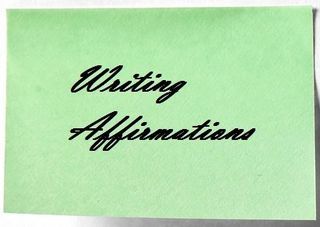 often when beginning authors think about what they���re writing, they scowl and wonder why they even bother. Their writing, they surmise, is horrible ��� poor cadence, clunky dialogue, dull plotting, etc., etc., etc.
often when beginning authors think about what they���re writing, they scowl and wonder why they even bother. Their writing, they surmise, is horrible ��� poor cadence, clunky dialogue, dull plotting, etc., etc., etc.
If that sounds like you, don���t be guilty of ���third-eyeing��� your writing. ���Third-eyeing��� is a term I borrowed from Hollywood acting coach Warner Loughlin; she advises her acting students not to ���watch��� their your own work as they give a performance. This only makes them self-conscious and so they second guess themselves. Likewise, authors shouldn���t ���watch��� your own writing of a novel or a short story as writing it; doing so means you���re criticizing a story before it���s even completed! There are still revisions to be made, after all.
Instead, just allow yourself to write, to be in the moment. If you finding yourself slipping into third-eyeing, remind yourself that you just want to enjoy the act of writing for its own sake.
Of course, realistically there likely are some issues with your novel or short story. But during the writing of the first draft ��� or even the second or third or fourth draft ��� is not the time to fret about them. Each draft is just like learning to walk; you didn���t walk perfectly on the first step you took, but with each successive attempt, you improved. Making a mistake, falling, and getting back up was part of the learning process. In much the same way, the low quality of what you���ve written and the work you put in to obtain that clunker is important, as it gives you the skills necessary to write a better book with less effort.
The time to analyze your writing for areas that need to be corrected is after you���ve written the draft. That���s when you proofread and write notes to yourself like, ���Use active voice in this sentence,��� ���Tighten this dialogue,��� and ���Refocus scene so main character is trying to overcome obstacle.��� Then start your next draft without third-eyeing yourself as rewriting that sentence, conversation or scene.
In short, when writing, don���t be afraid to stumble ��� just get up afterward!
Professional Book Editor: Having your novel, short story or nonfiction manuscript proofread or edited before submitting it can prove invaluable. In an economic climate where you face heavy competition, your writing needs a second eye to give you the edge. I can provide that second eye.
<A HREF="http://ws-na.amazon-adsystem.com/widg... Widgets</A>
Related articles
 Writing inspiration: Model a story
Writing inspiration: Model a story Writing inspiration: Read your favorite author
Writing inspiration: Read your favorite author Editing tip: Read for a solution
Editing tip: Read for a solution
April 29, 2016
Employ right keywords to boost book sales
Among the  most important marketing strategies you can employ to sell your self-published book is ensuring you use the best keywords. When uploading your book to CreateSpace or Kindle Direct Publishing, you have to identify at least one and up to seven keywords that will help readers locate your book. Often authors overlook this part of the process until they reach this point in the upload.
most important marketing strategies you can employ to sell your self-published book is ensuring you use the best keywords. When uploading your book to CreateSpace or Kindle Direct Publishing, you have to identify at least one and up to seven keywords that will help readers locate your book. Often authors overlook this part of the process until they reach this point in the upload.
Scrambling to come up with several keywords just to answer the question isn���t a good marketing strategy, though. In fact, you���ll likely list words that don���t help your book at all, even though they may be accurate words for a card catalog. For example, if you wrote about bicycle festivals and listed as keywords the cities where those celebrations occurred, unless they are quite populous it won���t help your book. Though listing such cities might be accurate, most people won���t look for your book via the city but instead through more general terms, such as bicycle festival.
There are a couple of schools of thought about how to determine which keywords are best.
One is to focus on how Amazon.com readers use a search engine to locate your book. For example, if you go to any Amazon.com page that peddles a paperback or an ebook, you���ll see a search engine at the top of the web page. If looking at an ebook web page, it says ���Kindle Store��� on the left side of the search engine. Your goal is determine what words people would type into that search engine to find a book like yours. Fortunately, you don���t have to do too much thinking.
Begin by deciding what would be the most general word that best describes your book. If I wrote a guidebook to bicycle festivals, for example, I would type bicycle into the search engine, and up will pop several different terms ��� such as bicycle touring and bicycle repair ��� for me to select from. These are the terms that others searching on Amazon.com have typed in. Write down the ones that are applicable to your book and continue this process until you have at least five but no more than seven words. These then are your keywords.
Another school of thought says to focus on the categories that Amazon uses to place books on its bestsellers list. So when using the search engine for bicycle terms, I might choose bicycle touring. This then brings me to a list of books that fit the search parameter; on this new web page���s left is a list of Kindle categories, which include such terms as Cycling and Travel Writing. Write down those categories that your book best fits until you have five to seven keywords.
Which method works better? I���ve experimented with both, and while each works, I prefer focusing on categories. Most readers using the search engine eventually click onto the categories to help them narrow the range of what they���re seeking, so getting yourself listed in a specific category is as good as using a search engine topic. Further, using such categories as keywords seems to help Amazon figure out which bestseller list to place your book when sales occur, and ultimately you want to end up on a bestseller list.
Professional Book Editor: Having your novel, short story or nonfiction manuscript proofread or edited before submitting it can prove invaluable. In an economic climate where you face heavy competition, your writing needs a second eye to give you the edge. I can provide that second eye.
&amp;lt;A HREF="http://ws-na.amazon-adsystem.com/widg... Widgets&amp;lt;/A&amp;gt;
Related articles
 Web text demands different kind of writing style
Web text demands different kind of writing style Q&A with Inventing Reality Editor Rob Bignell
Q&A with Inventing Reality Editor Rob Bignell Use hashtags to sell your book on Facebook
Use hashtags to sell your book on Facebook Do Kindle DP pre-orders help or hinder sales?
Do Kindle DP pre-orders help or hinder sales? Increase book sales by giving away first in series
Increase book sales by giving away first in series
April 28, 2016
Ways Microsoft ought to improve MS Word
The primary 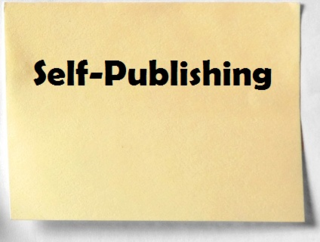 software that self-published authors use to write and format their books is MS Word, a word processing program. While MS Word has improved over the years, unfortunately it still works like a glorified typewriter and so isn���t well-suited for book design.
software that self-published authors use to write and format their books is MS Word, a word processing program. While MS Word has improved over the years, unfortunately it still works like a glorified typewriter and so isn���t well-suited for book design.
MS Word isn���t going away, though there are better programs out there for both writing and designing books. This largely is because of three factors: authors are familiar with the MS Word program; other programs (particularly book designing software) is an additional (and often a great) expense; and because Kindle DP and Smashwords allow authors to upload MS Word documents as ebooks.
Microsoft seemingly has little incentive to alter its software or offer a variation of it to be more book designer friendly, but it ought to be proactive. It���s simply a matter of meeting consumer���s needs, and as IBM found in the 1980s when the average person wanted microcomputers, new and less expensive software soon may usurp it.
Given that, here are nine ways MS Word software needs to change to become more user friendly for self-published authors, as well as those writing long academic papers, such as for a master���s degree or a PhD. These suggestions are based on more than a decade of personally using MS Word to write and format books as well as editing other writers��� formatted books and academic papers.
Simplify page numbering functions
Several non-intuitive, often confusing steps are needed to start numbering pages after the document's first page or to change the Roman numerals used in the front material to Arabic numerals in actual text. An author should be able to directly tell MS Word to number pages 1-4 as i-iv and pages 5 through 200 as pages 1-195 without placing page and section breaks throughout the document.
Simplify header and footer functions
Doing more than aligning a page number the same way on every page is extremely difficult despite that most books don���t follow that structure. MS Word should have a button allowing authors to design both a left- and-right facing page header or footer that is used throughout the document. This would allow page numbers and different wording (such as the author���s name on the left page and the book���s title on the right page) throughout the document.
Allow the Insert Hyperlink and Insert Bookmark pop-up screens to expand
Especially for ebooks, most authors hyperlink their table of contents to chapter titles with the book. Currently, because these two screens can���t be expanded, constant scrolling is required when creating multiple links within a document.
Add automatic vertical justification
Pages in MS Word often are left with more than a couple of blank lines above the bottom margin of a page while forcing whole or partial paragraphs to the next page. MS Word instead ought to function more like InDesign, in which the text automatically fills the space on the page right up to the margin without significantly changing the spacing between the lines.
Improve hyphenation
When justifying (or distributing text evenly between the left and right margins), MS Word fills the line by expanding spaces between words on that line. The result often is abnormally large blank spaces between words on a line of text. Instead, MS Word needs to have a larger internal list of words it will automatically hyphenate words at the end of a line to make those large spaces go away.
Add an auto hide of corrections marks made in Track Changes
Unless going through a long stretch of commands, so long as Track Changes is turned on every time you open a document the red proofreading marks show up. Seeing the red marks is extremely annoying. Why not a one-stop auto hide button so that the corrected version without the red marks shows up each time an author opens the document?
Stop converting a string of underscores into a ���border���
Ever have a line in an MS Word document that you just can���t get rid of? That���s because a long line is read as a ���border.��� Authors typically think of a long line as rule, however, that divides sections of text rather than part of a box that sets text aside as if it were part of a sidebar.
Fix the auto bullet system
A mess to use, once it���s on every time an author hits ENTER a new bullet appears; further, changing the tabbing between bullet and the text is difficult at best. A one-stop bullet button (with a drop-down menu that allows users to choose the kind of bullet ��� such a dot, an arrow, a square, etc. ��� to use) could be added. When the author hits ENTER, then next key to hit would be one for the bullet.
Add a two-page view
Authors want to see the left and the right side of a spread of their formatted book. That can be done by viewing ���multiple pages��� and then zooming in so only two pages appear. Why not just make ���Two Pages��� an option for viewing, however?
Professional Book Editor: Having your novel, short story or nonfiction manuscript proofread or edited before submitting it can prove invaluable. In an economic climate where you face heavy competition, your writing needs a second eye to give you the edge. I can provide that second eye.
&amp;lt;A HREF="http://ws-na.amazon-adsystem.com/widg... Widgets&amp;lt;/A&amp;gt;
Related articles
 Writing Inspiration: Seek another's advice
Writing Inspiration: Seek another's advice Five Great Quotations about the Writing Process
Five Great Quotations about the Writing Process Make tables readable in your self-published book
Make tables readable in your self-published book Forewords, prefaces and introductions
Forewords, prefaces and introductions Avoid introducing wrong styles into your text
Avoid introducing wrong styles into your text
April 27, 2016
Figure out this one: Analyst vs. annalist
This pair  of similar sounding words often is confused.
of similar sounding words often is confused.
An analyst is someone who examines information or materials ��� it might be financial trends or chemical solutions ��� to answer some question. Because of this, an analyst analyses materials and makes an analyses. For example, Aunt Jane used to work as a business analyst for a Los Angeles bank.
An annalist, however, is someone who writes or keeps history records. The records they keep are called annals. To wit, Aunt Dawn wrote annals about important geological expeditions in Utah.
To remember the differences, try this little tongue twister: An analyst might review annals to make an analyses, but an annalist never analyses.
Professional Book Editor: Having your novel, short story or nonfiction manuscript proofread or edited before submitting it can prove invaluable. In an economic climate where you face heavy competition, your writing needs a second eye to give you the edge. I can provide that second eye.
Amazon.com Widgets
April 26, 2016
Four writing prompts: Out of one���s league
Good stories 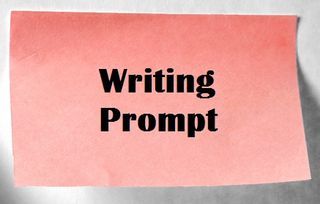 center on the clashing of characters��� goals and motivations. Sometimes a character���s goals and motivations arise from seeking something that is out of his league. Here are four writing prompts for stories that center on that conflict.
center on the clashing of characters��� goals and motivations. Sometimes a character���s goals and motivations arise from seeking something that is out of his league. Here are four writing prompts for stories that center on that conflict.
Man vs. nature
The main character is on a jungle (or a mountain climbing) expedition that suffers a freak accident, leaving many in the party dead. How does the main character survive in an environment in which he is out of his league and get home? What virtues does he possess that ensures his survival? What lessons does he learn during his effort to survive?
Man vs. man
How does the main character win the heart of someone who is out of his league? What is his motivation for pursuing this person? What traits does he posses that actually makes him the right person for the one who is out of his league?
Man vs. society
How does one win a position ��� e.g. a job or political office ��� that is out of his league? Why does he want to obtain this position, though doing so appears hopeless?
Man vs. himself
Our protagonist must suppress his attraction for another person who is out of his league. But that other person keeps showing up in his life, making the rejection of his feelings difficult. How does he gain the confidence to reach out to this other person?
Professional Book Editor: Having your novel, short story or nonfiction manuscript proofread or edited before submitting it can prove invaluable. In an economic climate where you face heavy competition, your writing needs a second eye to give you the edge. I can provide that second eye.
&amp;amp;lt;A HREF="http://ws-na.amazon-adsystem.com/widg... Widgets&amp;amp;lt;/A&amp;amp;gt;
Related articles
 Questions to ask yourself when plotting a story
Questions to ask yourself when plotting a story How to create an interesting villain for your story
How to create an interesting villain for your story Develop complex antagonist to maximize conflict
Develop complex antagonist to maximize conflict Rotate third-person limited to avoid issues
Rotate third-person limited to avoid issues
April 25, 2016
What makes a story character interesting?
What makes 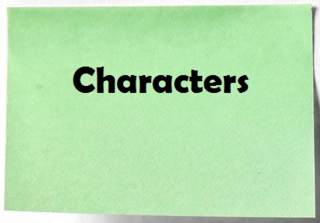 an interesting story character for the ages? It���s more than just having them grow or learn something, and it���s more than just having them being be like a real person. While each of those qualities are important, they are no more than a tree or two when you���re looking for a forest.
an interesting story character for the ages? It���s more than just having them grow or learn something, and it���s more than just having them being be like a real person. While each of those qualities are important, they are no more than a tree or two when you���re looking for a forest.
Let���s suppose we have a character who is a British secret agent/commando who has been snuck into Nazi-occupied France to help form an underground resistance and coordinate efforts with London. He easily could be a stereotypical tough guy, and while that might be fine for a pure action-adventure tale, the story could be so much more with a little character development. To ensure he ��� or any character in any story ��� more intriguing, we should make our Captain Oliver Smith:
Three-dimensional or round
A real person has a broad range of behaviors and often conflicting emotions. Our Captain Smith wouldn���t always be no-nonsense tough. He also would have moments when he feels empathy for others and so is helpful even though being so doesn���t serve his mission. He would have moments when he needs a break from the job and relaxes at the local taverne, when he would feel doubtful about the chances of his mission succeeding, when he would be afraid despite his training. He does not behave the same way in every single scene. Most importantly, by stories end he might change his viewpoint or overcome some internal flaw based on his experiences.
Consistent
Though real people evolve and change, they also are creatures of habit. Likewise, a story character must behave in a way that the reader would expect them to. This can be done quite subtly; perhaps Captain Smith always orders gin when he goes to the taverne. More significantly, consistency must arise from the character���s motivations, values and goals. Perhaps he possesses a strong sense of duty and so even when he doubts the success of a mission, he goes through with it. Indeed, even if Captain Smith does something surprising in a story, that he would do it must make sense based on his motivations and values.
Flawed
Real people are imperfect. While a person may be more good than bad, a lone bad decision he makes can carry severe consequences, which in a story can lead to great suspense and tension. Captain Smith���s flaw might be that he���s increasingly dealing with the stress of his mission (maintaining his secret identity, loss of fellow resistance fighters, constantly being in life and death situations) by drowning himself in alcohol. Of course, this eventually will hamper his ability to carry out his mission or perhaps he talks a little too much one night when drunk.
Unique
Every real person has some memorable quality about them, some distinct habit, behavior or tic that sets them apart from all others. In a story, this unique quality should make them ���cool��� from the reader���s viewpoint. Perhaps Captain Smith���s quality is that he can solve problems by being able to find unique uses of the few, limited resources he has around him. While this ability to think outside of the box and improvise makes him a master saboteur, he also should demonstrate this talent in other instances; perhaps he is able to help repair a villager���s car or house despite not having the proper tools or parts.
Relatable
Readers always should be able to identify with the character. This may seem to be out of your realm of control, but many of us face universal issues and concerns; you want to find where those issues and concerns intersect with your readers and include those qualities in your character. In the case of Captain Smith, he might find that he often wants to take action but can���t because others oppose him or because some frustrating circumstance arises; your readers likely will relate to this sense of having one���s hands tied. Able to identify with Smith, they then will vicariously delight in the scene when he actually cuts through the nonsense and accomplishes what he (and they) knew had to be done.
Professional Book Editor: Having your novel, short story or nonfiction manuscript proofread or edited before submitting it can prove invaluable. In an economic climate where you face heavy competition, your writing needs a second eye to give you the edge. I can provide that second eye.
Amazon.com Widgets



